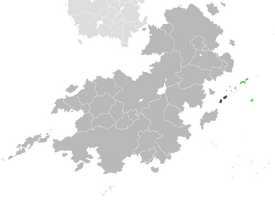South Kabu
This article is incomplete because it is pending further input from participants, or it is a work-in-progress by one author. Please comment on this article's talk page to share your input, comments and questions. Note: To contribute to this article, you may need to seek help from the author(s) of this page. |
Socialist Republic of Kabu Republik Sosialis Wong Kabupik (Kabuese) | |
|---|---|
| Motto: Persatuan, Merdika, Podo, Buruh Unity, Freedom, Equality, Labour | |
| Anthem: Ing Internasionale | |
 Land controlled by South Kabu shown in dark green; land claimed but uncontrolled shown in light green. | |
| Capital and largest city | Ayukarta |
| Official languages | Kabuese |
| Recognised regional languages | Masiorese |
| Demonym(s) | Kabuese • North Kabuese |
| Government | Unitary Socialist Semi-Presidential Republic |
• President | Tirto Sutikno |
• Premier | Susilo Dwi |
| Legislature | People's Senate |
| Establishment | |
• Kabu Colony | 1797 |
• Treaty of TBD | 1947 |
• Negara Darurat | 1984 |
• Current Constitution | 1994 |
| Area | |
• | 44,154 km2 (17,048 sq mi) |
| Population | |
• 2018 census | 7,841,984 |
• Density | 178/km2 (461.0/sq mi) |
| GDP (PPP) | estimate |
• Total | $101.459 billion |
• Per capita | $12,938 |
| GDP (nominal) | 2019 estimate |
• Total | $45.271 billion |
• Per capita | $5,773 |
| Gini (2020) | 23.1 low |
| HDI (2020) | high |
| Driving side | right |
| Calling code | +62 |
| Internet TLD | .ku |
South Kabu (Kabuese: Kabupik Kidul), officially the Socialist Republic of Kabu (Kabuese: Republik Sosialis Wong Kabupik) is a country in Southeast Coius constituting the southern part of the Kabu Archipelago. The country shares a maritime border with North Kabu across the strait of TBD. Like it's Northern counterpart South Kabu claims the entirety of the Kabu Archipelago and the overseas territories of Kingsport and Nouvel Anglet of Estmere and Gaullica respectively.
The first human settlers arrived in what is now South Kabu at around 500AD. The earliest evidence of human settlements come from Yuwana. Primarily these settlements were found on the coast of inland near Paddy fields and Rice terraces which are prominent to this day in South Kabu. Through trade and contact with Dezevau the Badi religion was spread across the Kabu Archipelago becoming the dominant religion in the archipelago influencing centuries of Kabuese culture.
Various Kabuese Kingdoms and states existed throughout Kabuese history, the most prominent is the Kingdom of Kabu which existed from XXXX to XXXX and was governed from TBD. The Kingdom of Kabu managed to gain control over much of the Kabu Archipelago. The Kingdom was able to prosper due to the expanding Spice Trade in the area. As the Kingdom became rich from the Spice Trade and it's location, the city of Sulapangan was ceded to the Estmerish TBD (East India Company) as a trading port for primarily spices. The company's influence grew over the Kingdom eventually allowing the company to gain a monopoly on the Spice Trade in the Kabu archipelago.
The Carolinian Islands colony was officially created in 1797 with the Colonial administration being based in Ayukarta. Estmerish rule over the archipelago continued almost uninterrupted until the outbreak of the Great War when Gaullica invaded and occupied the colony. Following the invasion the Gaullican administration on the islands promised the natives independence if Gaullica won the war leading to a surge in anti-Estmerish and pro-independence sentiment on the islands.
Following the war, various pro-independence anti-colonial militia's were set up. The largest in the South was the National Liberation Front of Kabu which was a Socialist group which desired an independent, socialist Kabu similar to Kirenia. Tensions between the Socialists and Nationalists led to the beginning of the Kabu Civil War between the Socialists and Nationalists eventually culminating in a stalemate and a ceasefire under the Treaty of X. Following the war, militia leader Sutikno Harjo was elected President. Sutikno was assassinated in 1984 leading to the beginning of the Negara Darurat which still continues until today.
Today, South Kabu is seen as a developing country with a high HDI and low income inequality due to the Socialist economic system in the country which has been in place since the Kabu civil war. South Kabu has a fast growing economy although development has slowed slightly in recent years. South Kabu faces severe problems with Poverty, Corruption and ethnic tensions between the Kabuese Majority and the various minorities in the country. South Kabu is a member of the Association for International Socialism; the country has also established Diplomatic relations with TBD countries.

